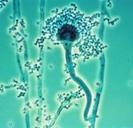 | ||||
Eukaryotes: Meet the Microbe
Practice Test Questions
Virtual Microbiology Classroom of Science Prof Online
Eukaryotic Microbe Sample Test Questions
Page last updated: 2/2015
You have free access to a large collection of materials used in a college-level introductory microbiology course. The Virtual Microbiology Classroom provides a wide range of free educational resources including PowerPoint Lectures, Study Guides, Review Questions and Practice Test Questions.
Aspergillus fumigatus
opportunistic fungus
SPO VIRTUAL CLASSROOMS
 | ||||||
1. People can catch Giardia by...
a. using butterfly nets
b. traumatic introduction like a cut or scrape
c. sexual intercourse
d. ingesting them (eating or drinking)
e. airborne droplets in coughs and sneezes
2. Hookworms are a type of ...
a. fungus
b. protozoan
c. helminth
d. entamoeba
e. mycosis
3. Blastomyces dermatiditis, Coccidioides immitis, Historplamsa capsulatum and Paracoccidioides brasiliensis are …
a. opportunistic fungal pathogens
b. types of protozoans
c. types of bacteria
d. common and widespread infections
e. true fungal pathogens
4. What might you find a lot of if you dissected your pillow?
a. mushrooms b. amoeba c. Aspergilla
d. Giardia e. trophozoite
5. Giardia is ...
a. fungus b. protozoan c. helminth
d. entamoeba e. bacteria
6. Aspergillus is …
a. a true fungal pathogen
b. an opportunistic fungal pathogen
c. a type of bacteria
d. a type of prokaryotes
e. a protozoan pathogen
The following questions, from the Virtual Microbiology Classroom, are designed to help students better understand this topic. All questions are based on material that can be found on the Eukaryotes: Meet the Microbe Lecture Main Page.
7. What is a mycosis ?
a. a bacterial infection
b. a viral infection
c. a protozoal infection
d. a parasitic worm infection
e. a fungal infection
8. Which type of mycosis would potentially be most life-threatening?
a. superficial b. subcutaneous c. cutaneous
d. systemic e. opportunistic
9. A fungal infection is most typically acquired…
a. from the environment
b. from another person
c. from an animal
d. all modes of transmission are common
10. What is an opportunistic microbe?
a. one that is not always harmful, but that can cause disease under certain conditions
b. bacteria that you need to have living in and on your body whenever you have the opportunity
c. microbes that live in and on your body without ever causing you harm
d. bacteria, like the microbes in yogurt, that we need to sometimes add to our GI tract to maintain your health.




